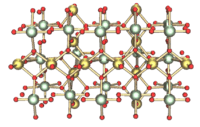Uranium trioxide facts for kids
Quick facts for kids Uranium trioxide |
|
|---|---|
 |
|
| IUPAC name | Uranium trioxide Uranium(VI) oxide |
| Other names | Uranyl oxide Uranic oxide |
| Identifiers | |
| CAS number | |
| Properties | |
| Molecular formula | |
| Molar mass | 0 g mol-1 |
| Appearance | yellow-orange powder |
| Density | 5.5–8.7 g/cm3 |
| Melting point | |
| Partially soluble | |
| Structure | |
| Crystal structure | see text |
| Space group | I41/amd (γ-UO3) |
| Thermochemistry | |
| Std enthalpy of formation ΔfH |
−1230 kJ·mol−1 |
| Standard molar entropy S |
99 J·mol−1·K−1 |
| Hazards | |
| EU classification | Very toxic (T+) Dangerous for the environment (N) |
| NFPA 704 |
|
| R-phrases | R26/28, R33, R51/53 |
| S-phrases | (S1/2), S20/21, S45, S61 |
| Flash point | Non-flammable |
| Except where noted otherwise, data are given for materials in their standard state (at 25 °C, 100 kPa) | |
Uranium trioxide (UO3) is a special chemical compound. It is also known as uranyl oxide, uranium(VI) oxide, or uranic oxide. This compound is an oxide of the element uranium.
UO3 is a hexavalent oxide. This means the uranium atom in UO3 has an oxidation state of +6. This number tells us how many electrons an atom has gained or lost in a compound.
Contents
What is Uranium Trioxide?
Uranium trioxide is a compound made from uranium and oxygen. It is often seen as a yellow-orange powder. This substance is important in understanding how uranium behaves chemically.
How is Uranium Trioxide Made?
Scientists can create uranium trioxide in a lab. One common way is by heating uranyl nitrate. When uranyl nitrate is heated to about 400 degrees Celsius, it changes into uranium trioxide. This process helps us get UO3 for different uses.
Is Uranium Trioxide Safe?
It is very important to handle uranium trioxide with care. This substance is considered poisonous. It is also slightly radioactive. This means it gives off a small amount of energy that can be harmful.
You should never touch, breathe in, or swallow uranium trioxide. If it gets on your skin or inside your body, it can be dangerous. Always follow safety rules when working with such materials.
Images for kids
 | Madam C. J. Walker |
 | Janet Emerson Bashen |
 | Annie Turnbo Malone |
 | Maggie L. Walker |




